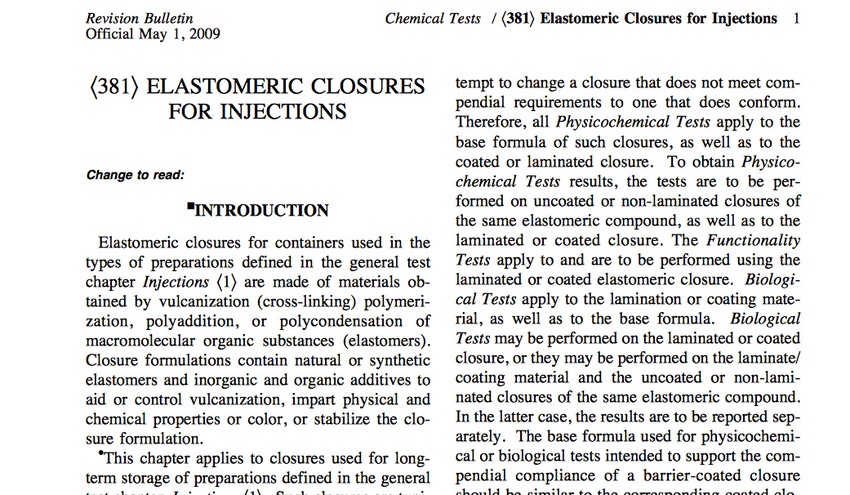November 25, 2015

Several packaging chapters within the U.S. Pharmacopeia—including some mandatory ones—are now being revised and updated, which could significantly influence pharmaceutical packaging development and specifications (tests, methods, and acceptance criteria) of packaging components. These changes will be covered at the upcoming conference at Pharmapack North America on June 9 in New York City.
The session, “Recent Changes and Proposed Changes to USP Packaging Chapters,” will be led by Dwain L. Sparks, who recently retired from Eli Lilly and Company with 39 years of industry experience focusing on container-closure component and system standards as well as test method development, during his last 20 years as a regulatory scientist. He has served as a past member of the USP Packaging and Storage Expert Committee and has been a key contributor to USP standards on container-closure performance testing. Now serving as a Strategic Advisor for YOURENCORE, Sparks continues to influence packaging standards and encourages industry to remain aligned with USP initiatives and changes to the packaging chapters, including, but not limited to <671> Containers-Performance Testing, one in which he is deeply invested over the past 5 years through his work with USP and Lilly.
Sparks will be joined by the following experts, who will cover specific USP chapters:
Michael Ruberto, President, MATERIAL NEEDS CONSULTING
Oliver Stauffer, Vice President/COO, PTI – PACKAGING TECHNOLOGIES & INSPECTION
Diane Paskiet, Director of Scientific Affairs, WEST PHARMACEUTICAL SERVICES INC.
Brandon Zurawlow, CCIT Project Manager, WHITEHOUSE LABORATORIES
Professionals developing and maintaining pharmaceutical packaging as well as drug-delivery systems are advised to keep abreast of these changes. “It is important for pharmaceutical packaging professionals to watch what’s going on through regulatory surveillance, especially what is transpiring with USP packaging chapters through proposals published bimonthly in the free, on-line Pharmaceutical Forum,” says Sparks. “We’ll provide a high-level, nonpartisan review of recent activity and the USP’s proposed work plan, which involves revising, rewriting, or adding major sections to several different chapters.”
Sparks will open the session by detailing all the packaging-related chapters undergoing some sort of change, which include:
Chapter <381> Elastomeric Closures for Injections
Chapter <659> Packaging and Storage Requirements
Chapter <660> Containers-Glass
Chapter <670> Auxiliary Packaging Components
Chapter <661> Containers—Plastics
Chapter <671> Containers—Performance Testing
Chapter <1207> Sterile Product Package – Integrity Evaluation
Chapter <1660> Evaluation of the Inner Surface Durability of Glass Containers
Chapter <1663> Assessment of Extractables Associated with Pharmaceutical Packaging/Delivery Systems
Chapter <1664> Assessment of Drug Product Leachables Associated with Pharmaceutical Packaging Delivery Systems
Sparks will then hand it over to Ruberto, who will discuss USP Chapters <661>, <1663>, <1664>. Ruberto was formerly the head of regulatory services for North America at Ciba Specialty Chemicals, where he was responsible for worldwide notifications of new products, food contact notifications, and regulatory compliance of Ciba chemicals. He also designed leachable and extractable studies for the FDA approval of medical devices, packaging, and labels used on drug containers.
Ruberto says that “for years, the established procedures for the safety evaluation of drug packaging systems involved antiquated compendia methods along with best practices established for inhalation products, which used ultraconservative thresholds and extraction conditions used to mimic the solvating power of drug formulations that are often very different from other dosage forms, such as parenteral products. Recently the USP has published draft general chapters that recommend a three-stage approach to establish the suitability for use of packaging materials using a combination of enforceable and informational general chapters. This approach includes a major modernization of USP <661> along with the publication of two new chapters , USP <1663> and USP <1664>.”
Ruberto’s presentation will summarize these newly issued documents and define the specific requirements and recommended methodologies for extractables and leachables testing for various packaging systems. He will also discuss roles and responsibilities for vendors and pharmaceutical companies.
Stauffer, who joined PTI in 2005 and was appointed as CEO in 2012, will cover USP Chapter <1207>. “USP <1207> was rewritten to reestablish requirements and expectations with regard to testing sterile barrier packaging,” says Stauffer. “FDA uses USP <1207> as a guide to relevant methodologies that can be deployed for package integrity testing, and FDA uses the same bar of risk-based assessment and suggested methodologies listed in the USP <1207> in regulating combination products. My presentation will encompass package integrity testing, USP <1207>, and regulatory shifts to come.”
Paskiet will cover USP Chapter <381>. Paskiet, who has been with West Pharmaceutical Services for more than 10 years, previously served as Associate Director for Monarch Analytical Laboratories and had been with that firm for more than 19 years.
Zurawlow will discuss both USP Chapter <661> and USP Chapter <671> from the perspective of a contract laboratory specializing in USP container qualification testing.
“Whitehouse Labs is on the frontlines with key pharma clients who are working to ensure that their containers and package systems meet regulatory requirements. Review, understanding, and experience with the specific current and proposed test procedures are imperative to successful implementation,” says Zurawlow. “Unfortunately, our hands-on experience has highlighted many areas of confusion and misinterpretation. This presentation will review real world examples of the state of chaos and confusion that has become prevalent within the pharmaceutical industry when it comes to container testing. We will highlight contrasting examples of the process working correctly with other chapters that has led to more effective and successful outcomes for industry. Addressing these issues in a public forum of peers can help the entire industry work on improving the entire container testing process.”
After the chapter-specific presentations, Sparks will moderate the panel discussion, “How Will the Revised USP Packaging Chapters Impact You?” which will offer an open discussion on USP changes. Feedback from the session will be provided to the USP Packaging, Storage, and Distribution Expert Committee.
Register here for the USP Packaging Chapters session, the full day (which includes further presentations on combination products and drug-delivery devices, labeling, and a panel discussion, “What’s Next for Pharma”), or for two full days of sessions. Day two will include a keynote presentation on packaging innovation from a WorldStar winner as well as include sessions exploring child resistance, human factors engineering, and anticounterfeiting and serialization programs direct from drug manufacturers.
If you have any questions about the USP Packaging Chapters session, please contact conference producer Daphne Allen at [email protected].
Session moderator Dwain Sparks can be reached at [email protected].
About the Author(s)
You May Also Like




